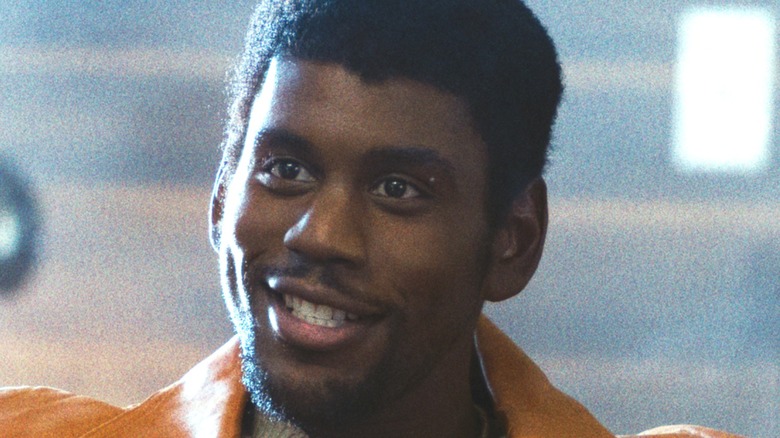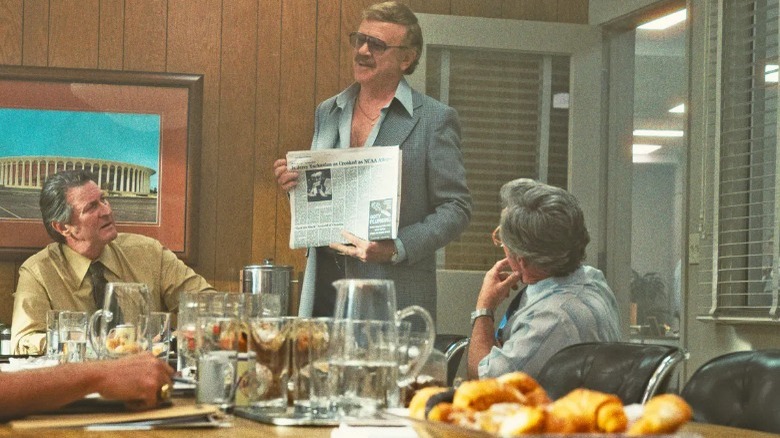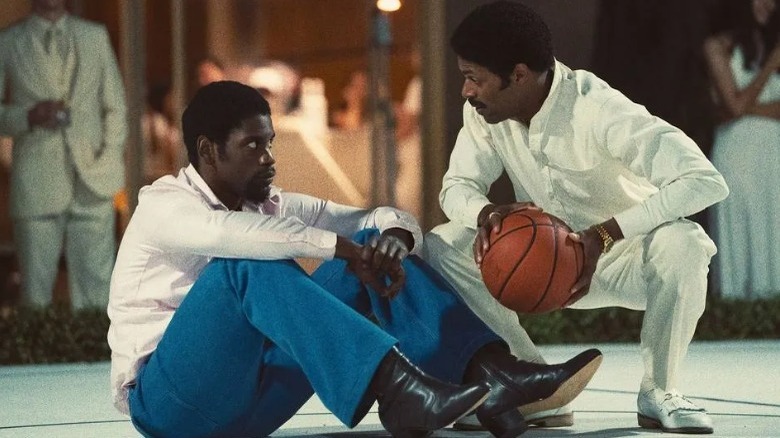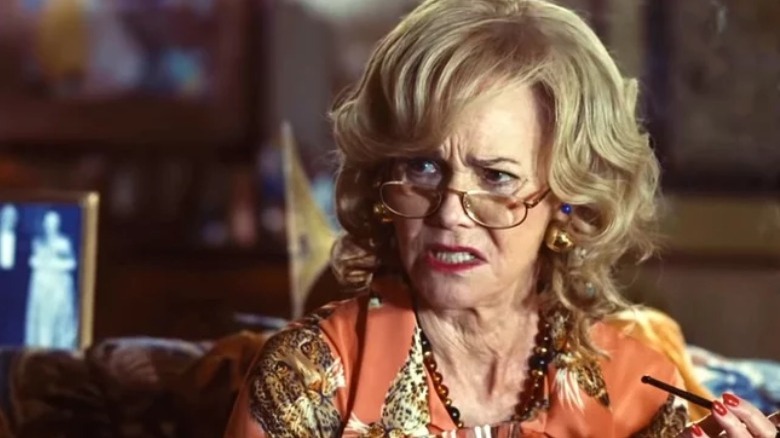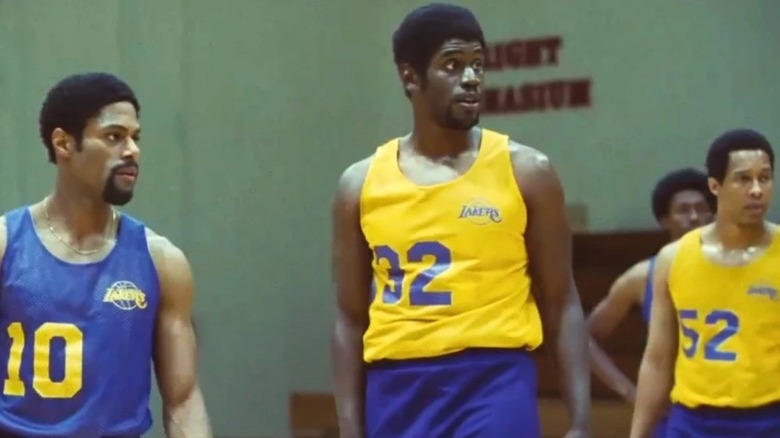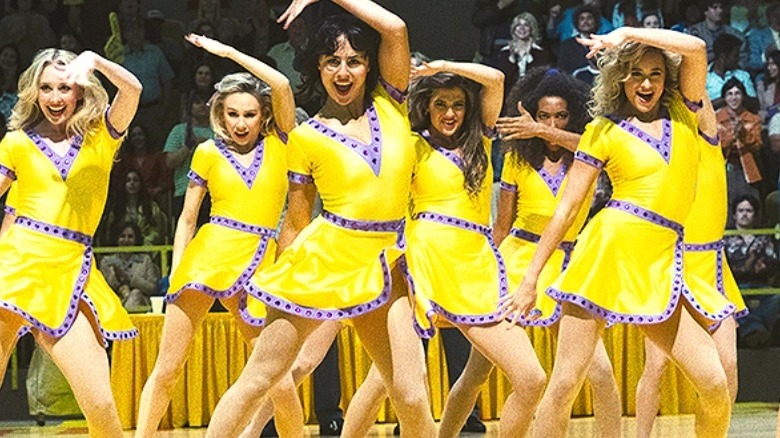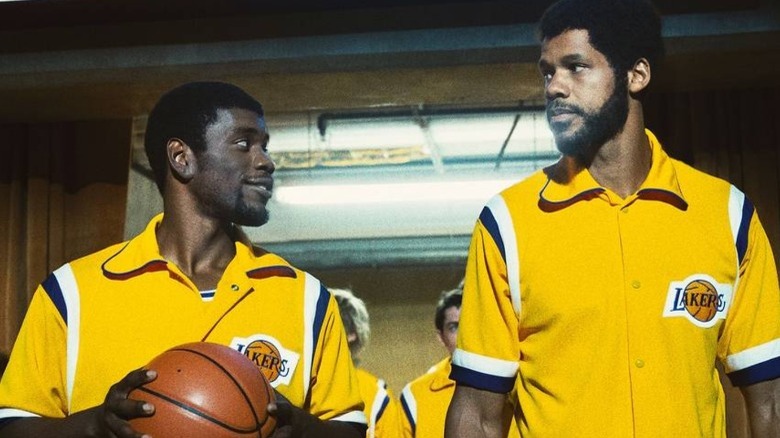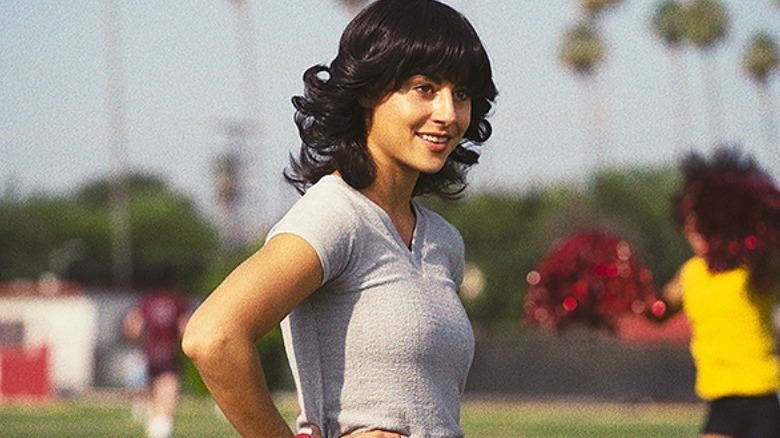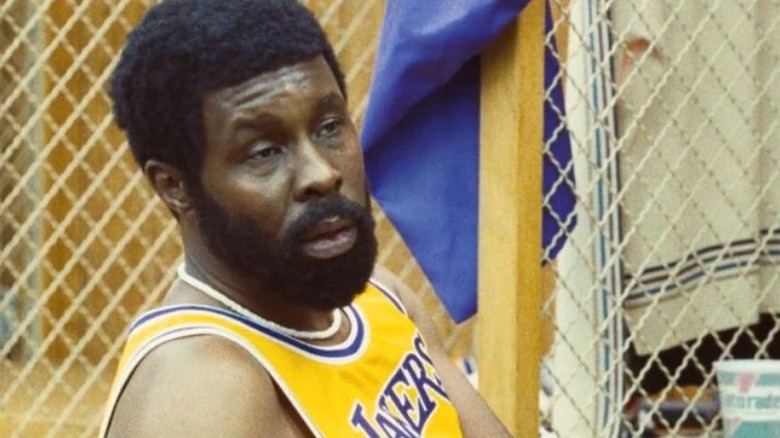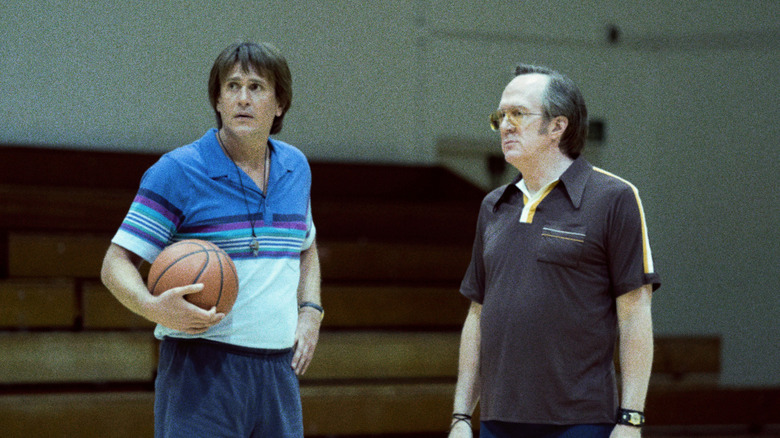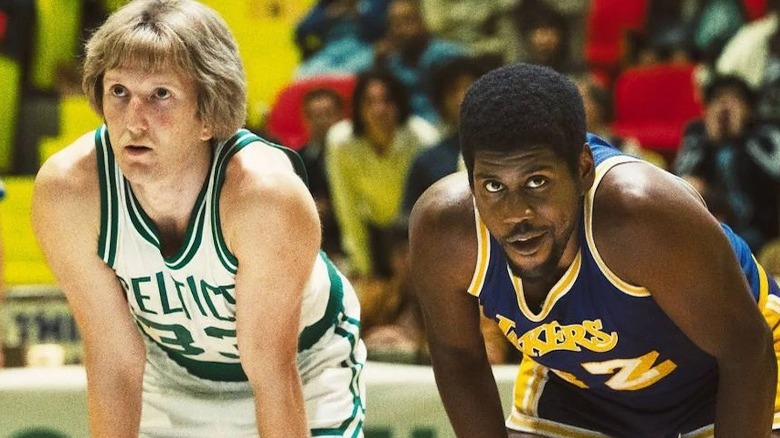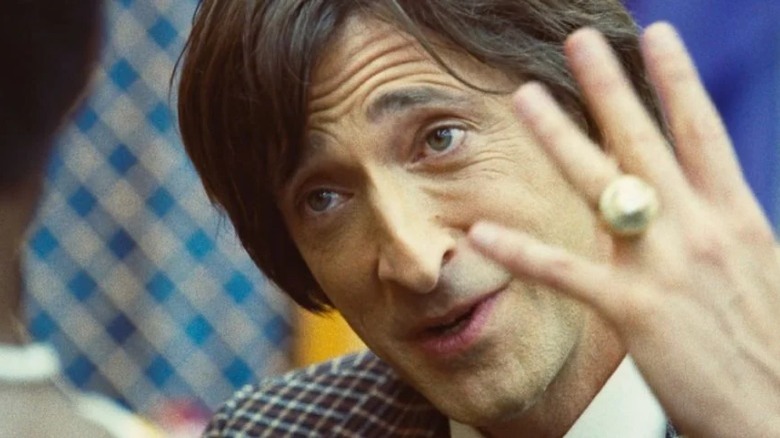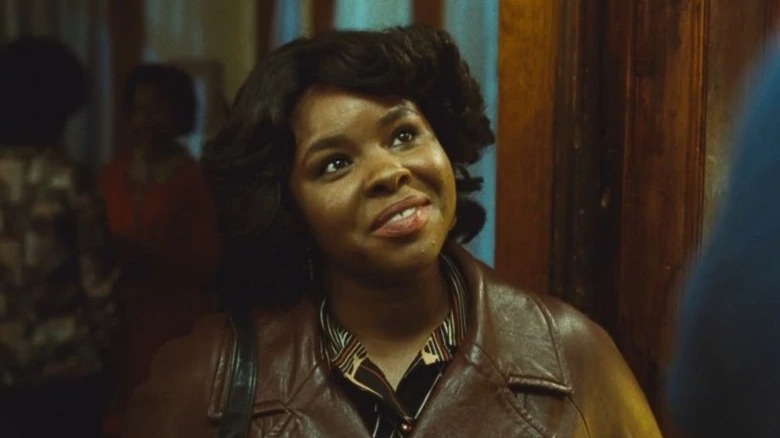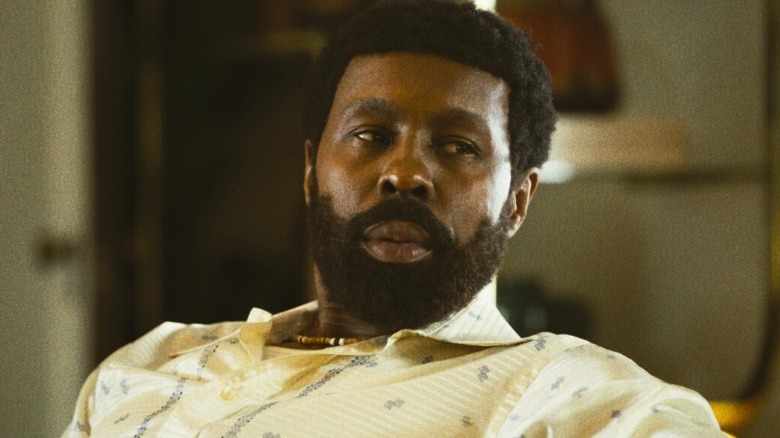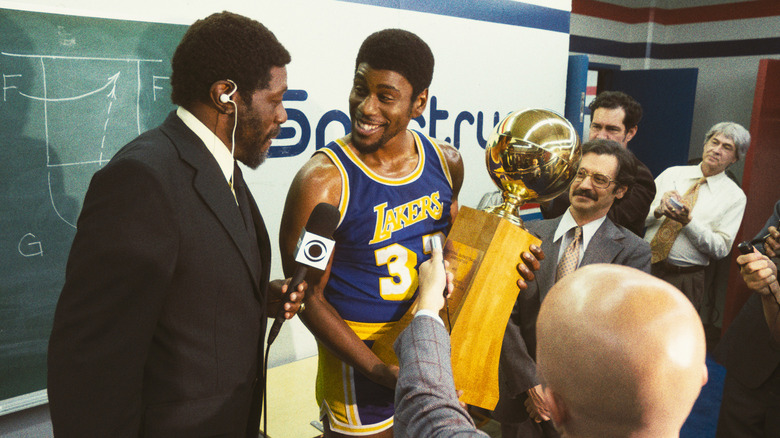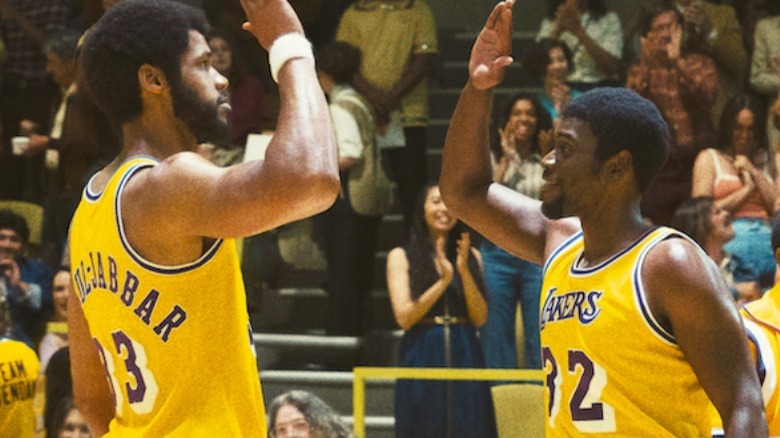Everything Winning Time: The Rise Of The Lakers Dynasty Gets Wrong About The True Story
"Watch me paddle," proclaims the owner of the Los Angeles Lakers, Jerry Buss, in HBO's "Winning Time: The Rise of the Lakers Dynasty." The line references swans, who gracefully glide through waters while doing the hard work of paddling below the surface. This idea encapsulates Jerry Buss's first-year journey as the owner of the Lakers as he guides the team towards financial success and the NBA Finals. This chronicle of Buss's leadership over the Lakers in the 1979-1980 basketball season is as much an allegory as it is a drama based on actual events. NBA heavyweights of the era like Kareem Abdul-Jabar tangle with rising stars in the league, like teammate Magic Johnson and his rival, Larry Bird of the Boston Celtics.
Despite the historical basis of the series, it's dramatized with a certain pizzazz inspired by the Lakers' showtime era. Critical moments are punctuated with fourth wall-breaking commentary by the series' star players or Buss himself. Emotional heft is sometimes sequestered in favor of tongue-in-cheek commentary informed by 40 years of hindsight. Regardless, Buss had a monumental task on his hands. Pulling the right people together to build a robust machine that was properly maintained is certainly akin to an aggressive beneath-the-surface paddle for his life.
Of course, a dramatization tends to exaggerate, spin, or omit actual moments in history to create an entertaining narrative and maintain a cadence that keeps audiences returning. Let's dive into the most prominent fictional elements depicted in the show.
Former Lakers owner Jack Kent Cooke was involved with finding a new coach
In Episode 3 of "Winning Time," the coach of the Lakers, Jerry West, drops a bomb in Jerry Buss' lap when he decides to resign. This causes a whirlwind panic that involves Buss setting out to find another coach for his newly-acquired team. Jerry West's resignation did happen heading into the 1979-1980 season. However, West actually resigned before Buss became the official team owner. This means that former owner Jack Kent Cooke was also involved in finding a new coach.
The show depicts Buss favoring Jerry Tarkanian for the job, but the Los Angeles Times reveals that Kent sought out Tarkanian for the gig (via NBC Sports). Both Kent and Buss met with Tarkanian's agent, Vic Weiss, to discuss the position. However, as the HBO series depicts, before negotiations could move forward, Weiss was murdered and eventually found dead in the trunk of his car. This murder, which the Los Angeles Times notes was never solved, may have steered Buss away from making a deal with Tarkanian as the Lakers would later hire Jack McKinney. Still, Cooke was very much so involved with Tarkanian's potential recruitment even though he isn't present in this part of the show.
No record exists of a one-on-one game between Norm Nixon and Magic Johnson
Magic Johnson turned many heads upon his entrance into the world of the Lakers. "Winning Time" goes to great lengths to depict a fresh-faced rookie ready for the big time who upsets the team's established order. The starting point guard, Norm Nixon, becomes envious of the newcomer and is shown challenging Johnson to a one-on-one game to put him in his place. While some of the disdain directed toward Magic in the show by his teammates is exaggerated, there was certainly a bit of contention burgeoning between Norm Nixon and Johnson when the latter joined the team. In fact, Johnson's trademark smile and happy-go-lucky attitude resonated with most he encountered, but Nixon harbored some jealousy.
In the book "Showtime: Magic, Kareem, Riley, and the Los Angeles Lakers Dynasty of the 1980s," Michael Cooper states of his teammate, "Jealousy is ugly," per Sportscasting. Cooper noted that Nixon's jealousy of Johnson was apparent. Despite the friction between the pair, there isn't any known instance of a grudge match between the two, as shown in the first episode of "Winning Time." This was simply a dramatic sequence to establish the immediate relationship between the two upon Johnson joining the team in 1979. Also, nothing grabs the audience's attention quite like an angsty game between rivals with a healthy dose of trash talk.
Jerry Buss's wife never took ownership of the Lakers
Jerry Buss experiences a tumultuous first year as owner of the Lakers — albeit one that would be quite successful. "Winning Time" presents an ever-evolving financial struggle once Buss takes the plunge. Along with the purchase of the team and its assets come liabilities, which include debt. Buss's accountant mother, Jessie, informs him that the previous owner paid for many of the team's assets with a loan that has now been passed on to Buss. Since Buss sinks nearly every dime he has into the deal, he doesn't have $3 million to repay the loan. She suggests giving the team to Buss's ex-wife while retaining the loan. That way, his ownership of the Lakers would be protected, and he could file for bankruptcy without losing the team.
While Buss initially doesn't want his ex-wife involved, Jeanie, his daughter, gets her mother to sign the paperwork to take ownership. Buss is relieved when he finds out that his ex-wife went through with it. Granted, actual ownership is never transferred in the show because Buss's mother forgot to send in the paperwork to seal the deal. Buss is forced to put on a front with the bankers to ensure they believe he would be profitable and capable of paying the loan with an extension. Still, the move to transfer the team to Joanne Buss never occurred in real life and is simply a moment to play up the drama of managing the financial side of an NBA team.
Magic Johnson didn't fight with Ron Boone
Over time, animosity grew between Johnson and some of his teammates regarding one particular sticking point. As Johnson explains in an interview on "Uninterrupted" with Maverick Carter, his relationship with Jerry Buss often put him at odds with his teammates. Apparently, an unspoken rule existed where it simply wasn't seen as proper for players to build a friendship with the owner — but that's exactly what Johnson had done. However, despite any frustration that it sparked in Johnson's teammates, the show labors to establish dramatic tension that may have been exaggerated.
In the fourth episode of "Winning Time," Ron Boone is shown being agitated over Magic's quick passes and showboat demeanor. Eventually, Boone shoves Magic after the young buck cheerily celebrates a shot. This provokes the spry young rookie to clock Boone in the chest. As the fight breaks out, the other teammates come rushing in to break it up. However, there is no record of physical conflict between Boone and Johnson in reality. This moment was likely a fabrication of the show to continue positioning Johnson as the rookie who upset the established order.
There is no record that Jeanie Buss had the idea for the Laker Girls
As an astute businessman, Jerry Buss sets out to make Laker games a spectacle. Buss develops ideas that eventually renew interest in the NBA as a whole. He revamps the Laker cheerleaders to dazzle the crowd with a new routine. The show, however, depicts Buss directing the general manager of The Forum, Claire Rothman, to create ideas that will turn Lakers games into showstopper events. She and Buss' daughter, Jeanie, come up with the idea for a dance team with both pizzazz and sex appeal that'd ultimately be known as the Laker Girls.
Jerry Buss is floored and gives his stamp of approval. The big question then becomes — did Jeanie come up with the idea for the Laker Girls? Probably not. An oral history shared by the NBA states that Jerry was always a fan of entertaining dance teams, which solidified the idea of creating the Laker Girls. Additionally, Jeanie Buss has never taken credit for the dance team's creation. Jerry always envisioned a Lakers game as being a true entertainment experience all-around and this was the ticket.
Kareem Abdul-Jabbar didn't change his name in 1968
In the HBO production, Kareem Abdul-Jabbar is depicted as leading a conflicted life full of inner turmoil. Often, the harsh realities of the time collide with his religion and determination on the court — or lack thereof. Eventually, Johnson awakens a ferocity in him that helps take the Lakers through to the NBA Finals. However, being a loyal disciple and practitioner of Islam, Kareem often turns to his faith for guidance. Racial inequity weighs heavily on him. Through his conversion and name change, he seeks to be a more pure representative of his heritage.
The fifth episode shows a young Kareem, who was born Lewis Alcindor Jr. He converts to Islam and is seen participating in a Muslim gathering of prayer and worship in Harlem in 1968. "Winning Times" places this as the moment when he changes his name to Kareem Abdul-Jabbar. However, when Kareem shared the story of his conversion with Al Jazeera, he explained that he actually converted to Islam in 1971. This was also when he changed his name to Kareem Abdul-Jabbar, while he was still playing for the Milwaukee Bucks. For whatever reason, "Winning Time" shifted that event to 3 years earlier.
Paula Abdul wasn't an automatic selection for the Laker Girls choreographer
In "Winning Time," Jeanie Buss seeks to impress her father and help establish the Lakers dynasty. She even gives the future famous dancer and choreographer Paula Abdul her big break when she recruits her as the first Laker Girl. This comes after Jeanie visits Van Nuys High School and witnesses Abdul in action during cheerleading practice. It's like the star's career literally fell out of the sky and right in her lap!
However, the reality of the matter is that this depiction of Paula Abdul's entrance into the world of the Lakers isn't the truth. Instead, Abdul recounted on an episode of "The Late Late Show with James Corden" that she was approached by her friends to audition for a spot on the team. She took multiple outfits with her to the audition at The Forum and prepared to dance but was immediately cut before she even had a chance to show her stuff. Abdul then went into the restroom, changed to a different outfit, and auditioned again under a different name. This time, she was able to dance but was still cut. The third time's a charm, however. Abdul returned with a new outfit and spelled her name differently once again, and this time she made the cut.
Paul Westhead didn't start Michael Cooper in the game against the Denver Nuggets
Jack Mckinney's time as coach of the Los Angeles Lakers was short-lived as a bicycling accident left him comatose. His assistant coach, Paul Westhead, then had to step into the role and command the team. "Winning Time" depicts Westhead as a man shellshocked by the entire sequence of events, who buckles under the pressure of his newly-appointed role. Shortly after Westhead takes command of the Lakers, the team faces off against the Denver Nuggets. In the show, Westhead is conflicted with the decision over whether to select Michael Cooper or Spencer Haywood for the starting lineup. Cooper ultimately gets the nod, leaving Haywood feeling dejected.
The truth is that Westhead didn't consider Cooper or Haywood for the starting lineup, per MSN. He stuck with the usual opening roster, which included stars like Kareem Abdul-Jabbar, Magic Johnson, and Norm Nixon. Westhead wouldn't think of upsetting the established order this earlier in his career as interim coach. While the show doesn't explicitly give any reason for the narrative change, it sparks the drama of Haywood's animosity toward his teammates, eventually resulting in him losing his spot on the team.
Jack McKinney was only in a coma for three days
Jack McKinney's bicycling accident was no joke, and the moment depicted in "Winning Time" is accurate to real life. As McKinney rode his bicycle one November morning, the gears locked up. He was launched from the bike and hit his head on the pavement. McKinney suffered from a major concussion and went into a coma. As a result of the coach's sudden hospitalization, his assistant Paul Westhead was forced to take on the role of interim coach of the Lakers.
The show indicates that Jack McKinney was in a coma for nearly two weeks before finally waking. That's a substantial amount of time to lose. At that point, Westhead had already taken the reins as interim coach. However, McKinney's coma did not actually last that long. The Lakers coach awoke after three days, according to Esquire. The exaggeration of McKinney's coma period was likely a way to play into the drama unfolding with Westhead's sudden career change while coping with his friend and mentor's injuries.
Magic Johnson and Larry Bird's first professional game against each other went differently
"Winning Time" takes some liberties with regards to the rivalry between the Boston Celtics and the Los Angeles Lakers. In the series, Magic Johnson faces his college rival, Larry Bird, for the first time as a professional basketball player. The show peppers the coming game with hype as Larry and Magic share the spotlight in a press event with one another. However, the show seems to combine two separate games between the teams into one showdown. "Winning Time" gives us the big face-off as an away game in Boston. The two teams are neck and neck for most of the game. The shot that tips the game in favor of the Lakers comes from a last-second layup by Michael Cooper resulting in a win for the Lakers, 99 to 98.
The real-life first-time match-up between the two was a home game in Los Angeles. Also, the Lakers win was substantial, scoring 123 to the Celtics' 105. One month later, in January of 1980, the Lakers did face off against the Celtics in Boston. This game was much more of a nail-biter with the Lakers edging out the Celtics 100 to 98. While the score is slightly different (by one point), it's likely that the writers simply combined these two real-life games into one event for the sake of the show.
Pat Riley didn't aim to trade Spencer Haywood
"Winning Time" depicts Pat Riley suggesting that the Lakers trade Spencer Haywood for Bob McAdoo, who was with the Detroit Pistons at the time. Later, when Haywood catches wind of the suggestion, it further erodes his temperament, and he dives deeper into his drug addiction — which ultimately begins affecting his judgment and performance.
The question, however, is whether there ever was a plan in place by Riley and Paul Westhead to trade Haywood for McAdoo. There is no indication or record that this was ever the case. From a narrative standpoint, this further segued into Haywood's drug addiction which would eventually see him cut from the team. This moment, however, is a fun reference to the fact that Bob McAdoo did join the Lakers in 1981, even though it doesn't seem like Spencer Haywood was ever part of that exchange.
Rhonda is seemingly fictional
Magic Johnson was famously promiscuous, despite his deep and abiding love for Earletha Kelly, who often goes by Cookie. Rhonda Mitchell is introduced as a close friend of Cookie. While Magic tries to have a romantic relationship with his hometown love, Cookie, she drags her feet, not wanting to be swept up in the fanfare of his career. At one point, Magic begins having intimate relations with her best friend Rhonda while still trying to keep Cookie close. Eventually, Rhonda finds out that she's pregnant, threatening Cookie's relationship with Magic.
However, Rhonda isn't real. Per Hollywood Life, Magic Johnson only fathered three children: two with Cookie (one of whom was adopted) and another with a woman named Melissa Mitchell. It's possible that the show drew inspiration for Rhonda from Melissa, given the identical surname, but this relationship occurred during a break in Magic and Cookie's relationship. This fictional element is probably meant to stoke tension between Cookie and Magic in advance of the NBA Finals. As such, Rhonda, nor her pregnancy, ever existed in reality.
Spencer Haywood's exit went down differently
As "Winning Time" progresses, Spencer Haywood gets in deep with his drug addiction. He is often seen showing up to practice, and even games, intoxicated. As the truth of his continued drug use comes to light for the entire team, Paul Westhead must decide what to do about it. After sitting the team down, he explains that if Spencer is to be cut it should be a team decision. Therefore, Kareem leads a vote with the team which results in Spencer being cut before the Finals. Spencer becomes so bitter that he puts a hit out on the entire team.
In reality, Westhead did not leave this decision up to the team. It was his decision to suspend Spencer. As a result, Spencer lost his shot at obtaining a championship ring. In so doing, he drew Spencer's ire, who then plotted to have Westhead killed – a plan which never came to fruition — as he explained in an interview with Deadspin. Thankfully, the embattled NBA star came to his senses. Of course, the team decision entered the narrative to provide a sense of camaraderie leading into the big finale.
A few details of Game 6 of the NBA Finals were dramatized
It all came down to Game 6 of the NBA Finals – when the Lakers left their mark on NBA history. Much of Game 6, as depicted in "Winning Time," is accurate to real life, including the ending score and moments such as Magic Johnson jumping at the tipoff. But this is, of course, a dramatization for the entertainment of viewers first and foremost, right? So, in effect, the writers ensured that the game remained intense throughout.
Some elements were added to maintain the emotional stakes at play. For instance, Michael Cooper didn't get hit with a hard foul. Additionally, the show keeps the gap between the teams' scores narrower throughout the game than what actually occurred. Beyond that, Magic Johnson didn't suffer from exhaustion to the degree of needing to call a timeout at any point in the game.
Magic Johnson did not dunk on Dr. J in Game 6
There was one other detail in Game 6 that is a larger stand-out than the rest of what was altered for the sake of good television. "Winning Time" depicts Magic Johnson cozying up to Dr. J of the Sixers earlier in the show. However, he later finds out that he has been "wined and dined" by one of the all-time greats. That surface-level friendship causes Magic to go soft in his first bout with the Sixers, which resulted in a loss.
Whether that's how everything went down exactly isn't known. However, in Game 6 of the NBA Finals Magic's top rival, Larry Bird, isn't in the picture. As such, the show seemingly sets up a payoff moment for Johnson to dunk on Dr. J. While this is a satisfying moment from a narrative point of view, it did not actually happen. But it sure makes great TV!
